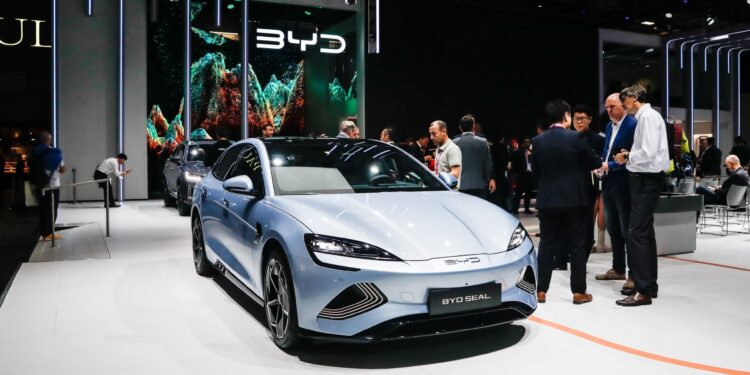Chinese automakers have urged the government to impose higher duties on European gasoline-powered cars in response to EU restrictions on Chinese-made electric cars. Reuters reported that the proposal was discussed in a closed meeting attended by representatives of the Chinese and European auto industries.
The Chinese newspaper Global Times was quoted as saying that the national auto industry is pushing for tough countermeasures, indicating the possibility of increasing temporary tariffs on European gasoline cars with large engines.
The primary goal of the meeting was to pressure Europe to reconsider the fees it announced its intention to impose on Chinese electric cars under the pretext of competitive protection.
An industrial source revealed to Reuters that both Europe and China have reasons to search for a solution – in the coming months – to avoid escalating tensions and incurring additional costs of billions of dollars for Chinese electric car manufacturers.
The position of the European Commission
On June 12, the European Commission announced the imposition of anti-subsidy fees of up to 38.1% on imported Chinese electric cars starting in July.
This move comes in the wake of a similar decision taken by the United States last May to increase customs duties on Chinese cars, which exacerbated the trade conflict between the West and Beijing.
A European Commission spokesman said, “We are studying the situation with the aim of discussing the possibility of reaching a solution acceptable to both parties.”
Trade tensions
EU trade policy has become increasingly cautious due to concerns about China’s production-focused, debt-driven development model. Concerns are mounting that this model could lead to an influx of cheap goods, including electric cars, into the 27-nation bloc, as Chinese companies look to boost their sales abroad amid weak domestic demand.
The European Union believes that its decision to impose anti-subsidy fees comes as a measure to protect the automobile industry in member states from what it considers to be unfair competition from heavily subsidized Chinese electric cars.
Industry feedback
European car manufacturers are participating in the discussions, as they are aware of the potential impact of increased tariffs on their market access in China.
Both sides appear to have an interest in finding a mutually beneficial solution to prevent further escalation.
“It is in the interests of both Europe and China to reach an agreement that prevents further disruption and additional costs for the auto industry,” commented one industry source.
In the midst of these tensions, Reuters said that the upcoming discussions between the European Commission and the Chinese authorities are crucial in determining the future of trade relations in the field of cars between the two sides.
With significant financial risks and market access at stake, the two parties are expected to negotiate intensively to reach a compromise that mitigates the impact of the newly imposed duties.



